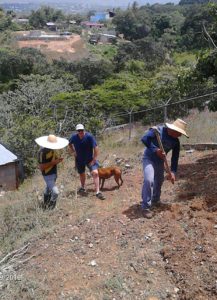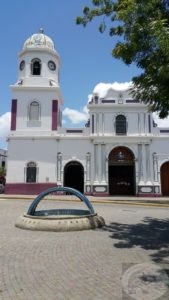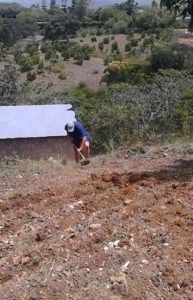A Precarious Situation
So here I was then, on an overnight bus to Barquisimeto, having been strip-searched and wished a good night. The remainder of this leg of the trip went by uneventfully; there were one or two other occasions when the bus was stopped by the National Guard, but no further searches were done, only documents were checked. As the hours slipped by, I recalculated my ETA, and it soon became apparent that I would be more likely to arrive closer to lunch time than breakfast. Without any connectivity, I had to finally rely on scant WiFi service at the bus station in Barquisimeto to message my host that I had arrived. A short while later, I was whisked away and through the downtown areas of the city to a comfortable real estate development consisting of several low-rise condominium buildings with all the services and amenities you could ask for in such a development.
Hardships Witnessed
My host, a veterinarian, introduced me to his mom, and gave me some time to settle in. Asked if I wanted to join him for a quick trip to a vet laboratory to drop off some samples, I could hardly refuse a chance to take a swing through the downtown areas of Barquisimeto. There was some traffic, but what was striking was the age of the vehicles – nearly all seemed to be from well before the turn of the century, or at least their condition seemed to have aged them to that era. More obvious, however, were the long line-ups of people at supermarkets and grocery stores. “Sometimes”, I was told, “people will stand in line for basic necessities such as rice, corn, flour, for hours, and quite often, after standing there for up to 6 or 8 hours, they are turned away at the last moment because supplies have run out.” As for other basics such as toilet paper, toothpaste, sugar, cooking oil, “forget it, long since not available.” This of course explained why there was such a huge crowd of people at the border going in both directions, from Venezuela to Colombia, to buy goods, and the reverse flow of people burdened down by huge bags of goods purchased in Colombia to be taken back home, “if they make it without being robbed of everything along the way at checkpoints,” was the sad and quiet response, in a country where the price of gasoline is 2 cents per litre, but doctors and nurses have been told they will be fired if they talk about the malnourished children being brought in on a daily basis and dying in hospitals around the country because of a lack of food.
Injustice, Illegitimacy, Depravity
I don’t mean to be so negative or downcast, this should not be the outlet for that, however, there are occasions in life when you know what you are seeing and experiencing is not right, and to stay silent is to condone.
We drove on quietly for a few moments before turning down a few side streets which took us to one of the most important churches in Venezuela, Iglesia de la Divina Pastora – the church houses a statue of the Virgin Mary holding the infant Jesus, with a lamb at her side. Dating from 1735, the image is the patron saint of the city, and it is venerated each year on 14 January with one of the world’s largest Marian processions, attracting hundreds of thousands of people. The statue is carried from the church to the city’s cathedral, a distance of approximately 7kms followed, in 2011, by more than 3 million people. The church itself is not large, nor is the statue particularly imposing, but apparently its history is said to be filled with several miraculous occurrences… one can only hope that some sort of miracle will happen in this country, as the present conditions are intolerable and people are losing their lives daily as they protest against a government that has lost all legitimacy and humanity; a government that is propped up by a military that is supposed to protect the people yet is, along with many political leaders, raping, pillaging and killing with abandon…
Ensuring a supply of food
It was on the following day when I became a farmer again, well, for a short period of time anyway. Born on a farm, raised on a farm, I guess you just can’t get all the farming blood out by living life in a city, and I can’t refuse a chance to get my hands dirty for a bit and doing a bit of physical labour. We drove for nearly an hour to the outskirts of Barquisimeto, to the home of my host’s sister and her husband and kids. We arrived while the sun was not yet quite at its zenith, and lunch would be at least another hour or so. In the back yard, on a steep slope, we could hear the sounds of physical labour, a pair of hoes chopping into the soil. A small field was being prepared for corn production – smart move, considering the scarcity of this staple in the country. After introductions and a chat, the work started again.
I watched for a few moments, but got antsy just standing still. I paced the property for a bit, then sauntered back to where the land was being tilled, and as one of the men had started planting the corn seeds, I grabbed the hoe and started clearing the grass and debris. For the next hour, quiet banter with the odd burst of laughter filled the air as the field was cleared, tilled, and planted. As we were watering the plot, the lunch bell rang out, and we made our way toward home. I could smell the delicious aromas of a variety of dishes wafting on the air, and despite the scarcity of provisions in the city, a fabulous repast had been created. Nothing tastes as good as plain ordinary rural fare, no matter what country you are in, particularly after spending some time doing physical labour in the fields.




